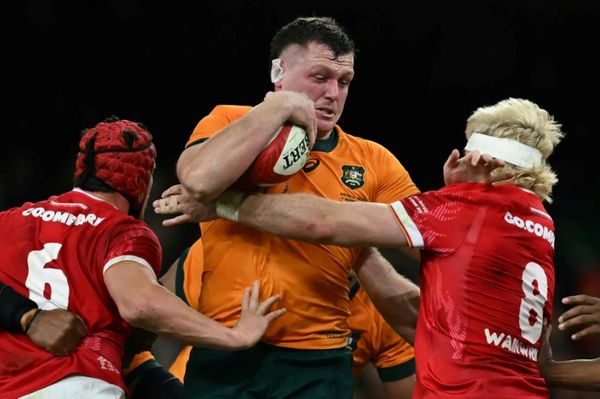The coin toss controversy is back, courtesy of Kansas City Chiefs quarterback Patrick Mahomes.
For what it's worth, 49ers coach Kyle Shanahan isn't buying it.
Mahomes had the gall to lead his team on a 75-yard, eight-play drive for the game-winning touchdown in a 42-36 win Sunday night over the Buffalo Bills on the first possession of overtime. Counterpart Josh Allen, every bit as magnificent as Mahomes throughout an all-time classic playoff game, never made it off the bench.
Those are the rules. Score a touchdown, game over.
Truth be told, if the NFL decided today to let both teams have an offensive possession in overtime, I'd be fine with it. But the rule as it stands isn't a death sentence when it comes to winning and losing. Games aren't coming down to heads or tails.
Shanahan has some experience with overtime success and failure. The 49ers won in overtime twice this season against Cincinnati and the Los Angeles Rams because his defense didn't allow a touchdown.
With the score 20-20, the Bengals got the ball to the 49ers' 19-yard line on their first possession, but Nick Bosa sacked Joe Burrow on third-and-3. Cincinnati had to kick a field goal, the 49ers got the ball back and Jimmy Garoppolo drove them for the winning touchdown and a 26-23 win.
Against the Rams in Week 18, the 49ers won the toss, got all the way to the Rams' 8-yard line, stalled and Robbie Gould kicked a 24-yard field goal. The Rams had their chance to win, but rookie corner Ambry Thomas intercepted Matthew Stafford to win the game.
Bosa made a play. Thomas made a play. It is possible, and defenders relish the opportunity.
Shanahan also experienced the flip side, so to speak.
In the Super Bowl following the 2016 season as offensive coordinator of the Atlanta Falcons, Shanahan's unit never saw the ball as the New England Patriots drove the length of the field on the first possession for a 34-28 win.
Chiefs coach Andy Reid said Monday to make things "equal" in overtime should probably include both sides, offense and defense.
Shanahan is fine with the way it is.
"It doesn't bother me. I think you should be able to stop someone on a touchdown if you want (the ball) back," Shanahan said when I asked him about the rule during a conference call. "It's real tough not to get (the ball), but I never felt it wasn't fair."
He even said he was fine with how overtimes were up until 2010, where a field goal on the opening possession would end the game, although Shanahan does like the current rule better.
"They give us the rules, you know the rules, and that's what you go in trying to win the game on," Shanahan said. "My mind doesn't change based on what happens."
Allen, fresh off the disappointment of not getting a shot in overtime for the Bills, had reason to feel aggrieved. He wasn't.
"The rules are what they are, and I can't complain about that because if it was the other way around, we'd be celebrating too," Allen said.
Any defense aspiring to be champions should feel it can prevent a touchdown with the game on the line. That's all we're really talking about. One possession. Do or die. Force a turnover. Get the ball back on downs. Even force a field goal to give your own offense a chance.
Buffalo ranked first in the NFL in scoring defense (17.0) and gave up the fewest yards per game (272.8). Mahomes got the ball back with 13 seconds left in regulation at his own 25 but got his team in position for a game-tying field goal. Then the Bills gave it up in overtime.
And it was the coin toss that beat Buffalo? If it was, the Bills would have walked off the field and the Chiefs would have celebrated the moment the coin hit the turf.
Look no further than the Raiders for evidence the coin toss doesn't decide the overtime winner. They haven't had an upper-echelon defense in forever but are 8-1 in overtimes under the current rule, which went into effect in 2010 for the playoffs and 2012 in the regular season.
In every one of those wins, both sides got the ball. Those subpar defenses did their job.
In playoff games since 2010 there have been 11 overtime games. Seven times the team that won the toss scored a touchdown on its first possession to win the game. Of course you want the ball and a chance to score and end it, but it's far from automatic.
When the 49ers hosted the New York Giants following the 2011 season for the NFC Championship, the Giants got the ball first, picked up one first down and punted. The 49ers took over with Alex Smith and went three-and-out.
They ended up losing on a Kyle Williams fumble off a Giants punt and a 31-yard field goal by Lawrence Tynes.
No one blamed a coin toss that night either.
It was Mahomes' brilliance combined with Buffalo's defensive breakdowns that doomed the Bills. They had every chance to make a play in regulation and then when it mattered most in overtime.
As far as defenses being exhausted in overtime, every team in the NFL talks about conquering adversity. Come through in overtime and it becomes one of those "never give up, never give in" moments coaches start trying to instill in training camp.
Bills safety Jordan Poyer, one of the best n the business, conceded as much.
"The defense has to be able to go out there and make a stop," Poyer said. "We weren't able to do it."
Change the rule, don't change the rule. That part of football will never change. Make a play or go home.







